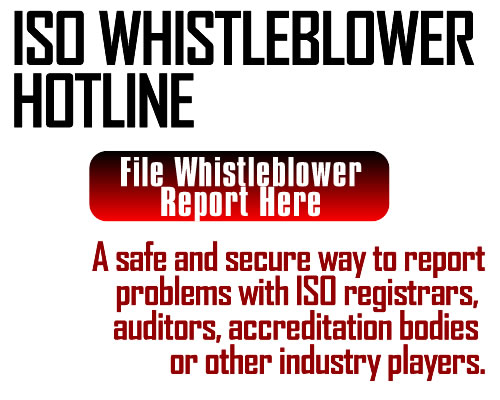ISO has released a free update to ISO 9001:2015 that will include mandatory language on climate change, over the objections of ISO member nations and standards users. The update is available for download from the official ISO webpage, as well as national standards organizations.
At the same time, the International Accreditation Forum (IAF) has issued two memos promising enforcement of the new language, in a move that is likely to cause confusion in the marketplace. In the first memo, new IAF Secretary Victor Gandy announced the IAF will be enforcing companies to address climate change in their various management systems, regardless of whether the subject is within the scope of the standard.
It is not the intention of the changes to (for example) turn a health and safety management system audit or a road traffic safety management system audit into one that disproportionality considers Climate Change, though this does not of course understate the importance of Climate Change.
IAF and ISO would like to emphasise that Climate Change is a vital topic and, while the addition of climate considerations is highly important, the standards have always included the need for all issues affecting the management systems to be considered by the organization. Therefore, many organizations implementing MSS will already be taking Climate Change into account.
According to a second document, the IAF is promising to enforce assessment of the new language as follows:
- ISO 9001 and other certified companies must prove they have “considered Climate Change aspects and risks within the development, maintenance, and effectiveness of their own management system(s).”
- Certification Bodies (CBs) must then verify that the certified companies have considered climate change, and verify the decision-making process.
- Accreditation Bodies (ABs) will then ensure the CBs are verifying the climate change decisions of the certifeid companies.
The cynical nature of the decision is evident in the fact that the IAF did not impose climate change considerations on either the CBs or ABs, but instead only tasked them with ensuring the issue is addressed by certified companies. Both ISO and IAF appear unconcerned with the impact of CBs and ABs on the climate, which is striking given the amount of international travel performed by thousands of auditors from those organizations around the world.
Gandy’s memo does not indicate a deadline for certified companies to implement the change, but instead suggests that it should be done immediately. Gandy wrote, “upon publication [of the amendment on 23 February 2024], certification bodies should include the new text in their auditing of the organisation and its context.”
This appears to mean that CBs will begin auditing the climate change requirements at each certified company’s next scheduled audit. This runs contrary to long-standing tradition, in which the IAF and ISO grant companies a three-year transition period to implement such changes.
The decision to enforce the ISO “London Declaration” comes as the IAF refuses to enforce basic rules for accreditation bodies, a function which comprises their main alleged responsibility. The IAF has not commented nor taken action, for example, on the recent news that a fully accredited CB issued an ISO 9001 certificate to an Indian legislator and that the CB involved is managed by the legislator’s own social media manager. ISO 9001 certification cannot be granted to persons.
The Origin of Climate Action in ISO
The move to force climate change into ISO standards was prompted by ISO Secretary-General Sergio Mujica, who latched onto “climate action” as a means of burnishing his credentials for a planned run at the UN Secretary-General position in 2026. Mujica claimed to be supporting the 17 UN Sustainable Development Goals, but then only chose one to impose in the text of ISO standards. Mujica held a meeting with a set of friendly ISO member representatives to give the move the appearance of an imprimatur, and later branded the decision as the “London Declaration.” This was a relatively transparent attempt to make Mujica’s move sound as weighty as the UN’s “Paris Agreement” on climate change.
Mujica then largely ignored the remaining 16 UN SDGs. Sources close to ISO reported that Mujica felt a number of these were political “third rails,” such as “no poverty,” “zero hunger,” or “reduced inequalities.” One source said, “Mujica chose ‘climate action’ because it was the easiest for him to promote without alienating a larger portion of ISO’s stakeholders.”
The IAF appears to be helping Mujica in his efforts. Had ISO and the IAF adopted its traditional three-year transition period, the changes would not have been visible in the marketplace until 2027, long after Mujica’s planned run for UN Secretary-General.
Nigel Croft then worked to push the climate change agenda into all ISO standards, acting as Mujica’s front-line offense and point of contact for the ISO Technical Committees. In a post on LinkedIn, Croft congratulated ISO for rolling out the change, impacting over two dozen standards:
Very happy to see that on February 23rd a total of 31 ISO Management System Standards will have amendments issued (free of charge) to address Climate Change considerations, coinciding with ISO’s 77th Birthday.
ISO is simultaneously pushing ahead on an “early revision” of ISO 9001 which is expected to be released in 2025. That came after ISO member nations and official representatives voted multiple times not to revise the standard. ISO chose to ignore those votes, and press ahead on revising the standard regardless, largely to satisfy Mujica’s political ambitions.
Croft is a promoter of the “early revision,” as well, and has avoided questions about the prior votes that rejected the effort.





